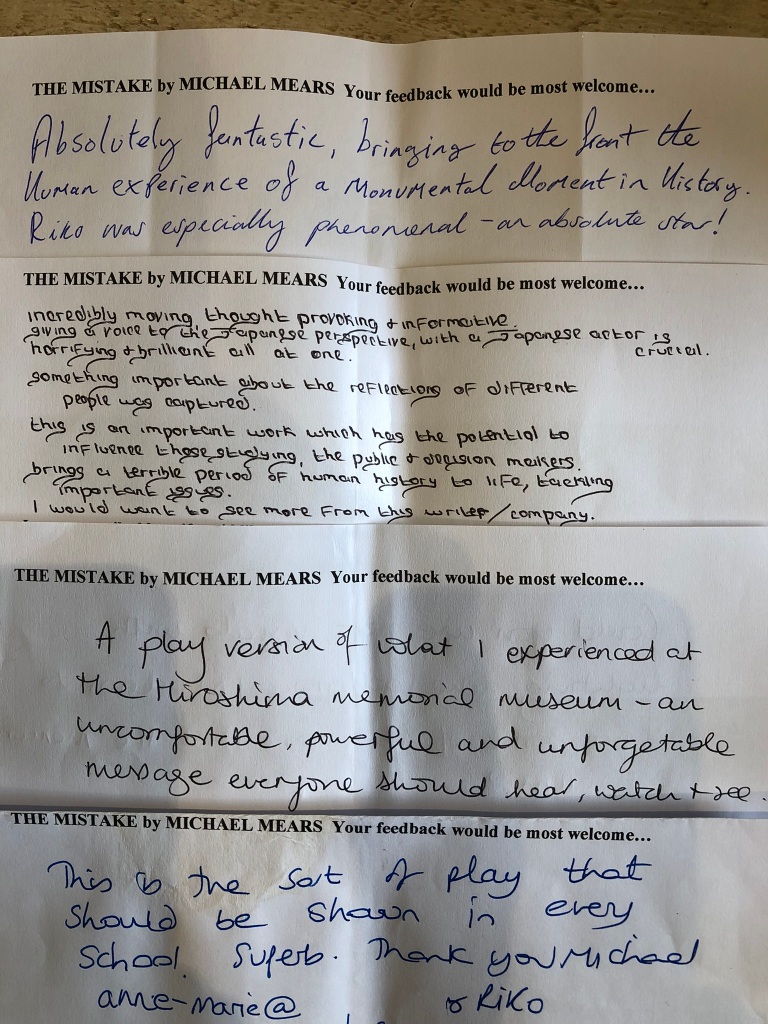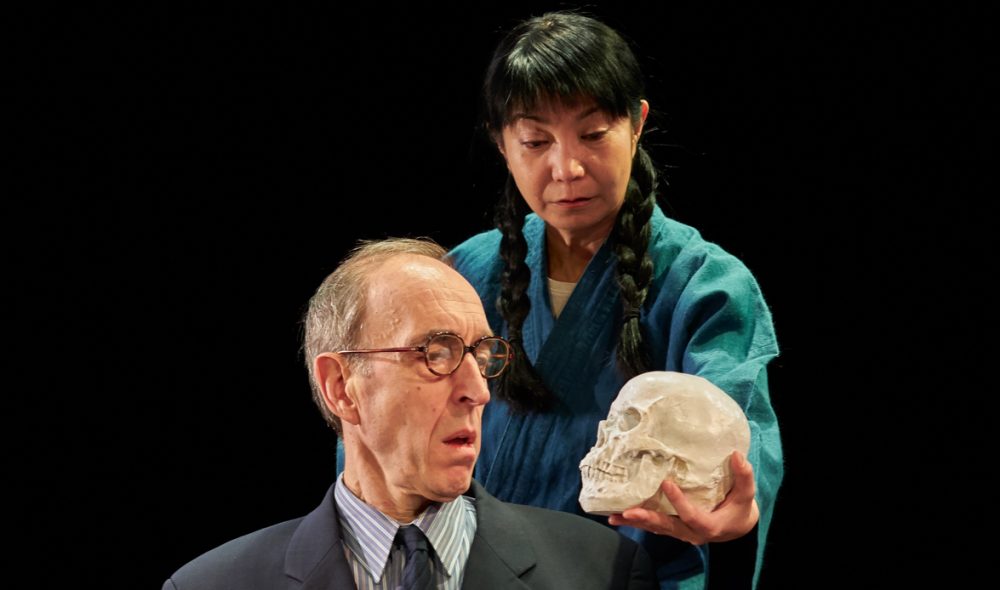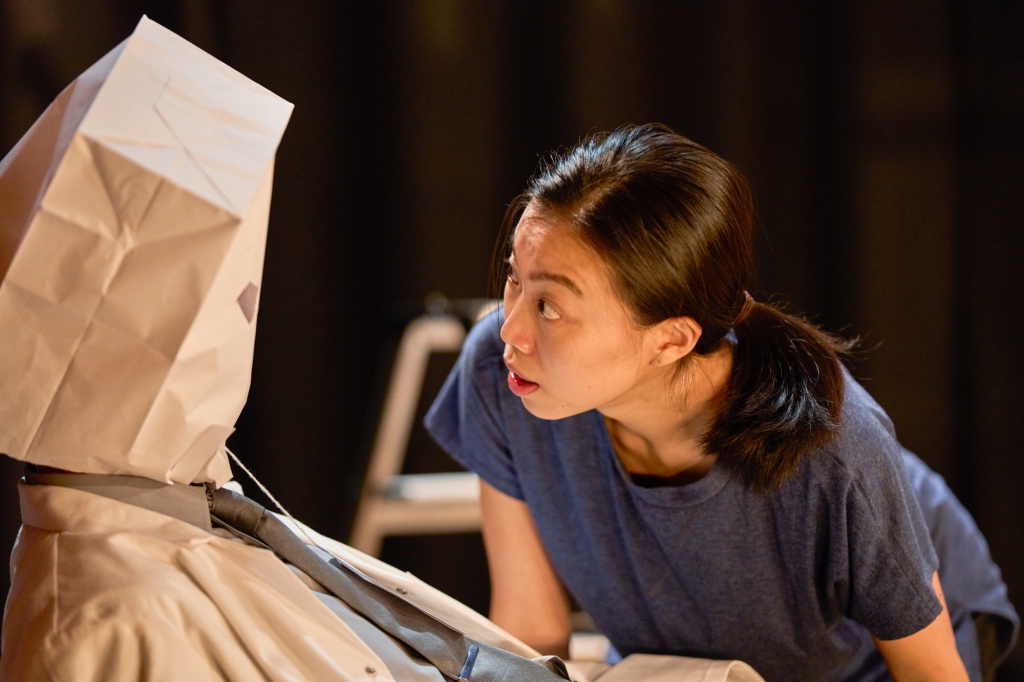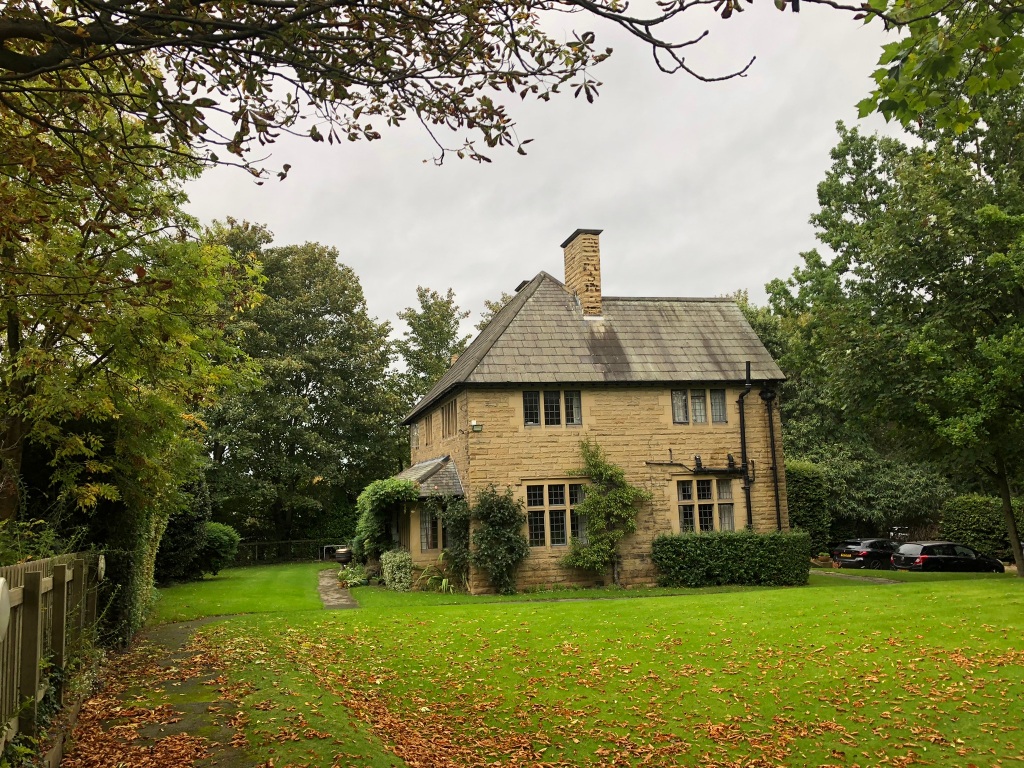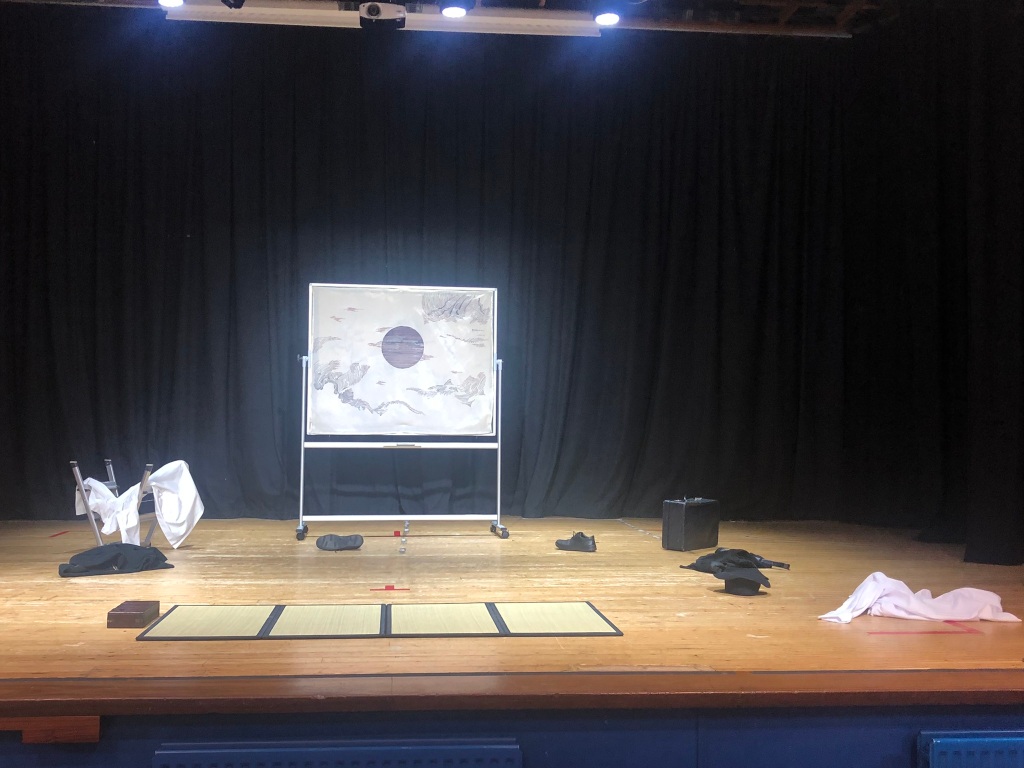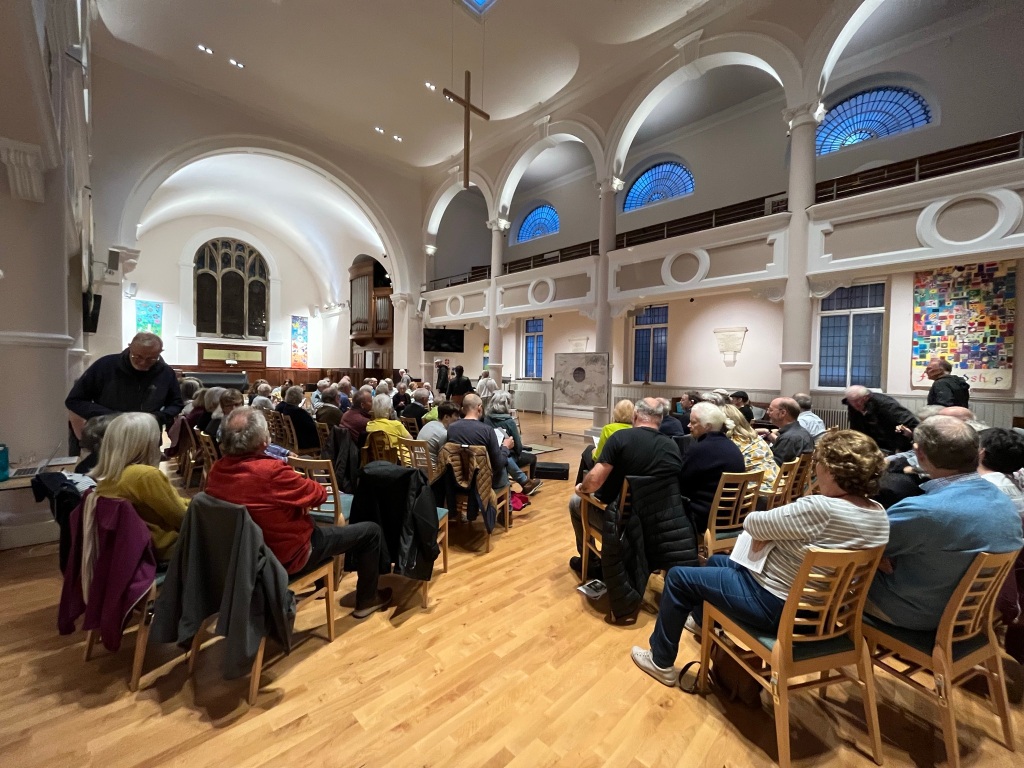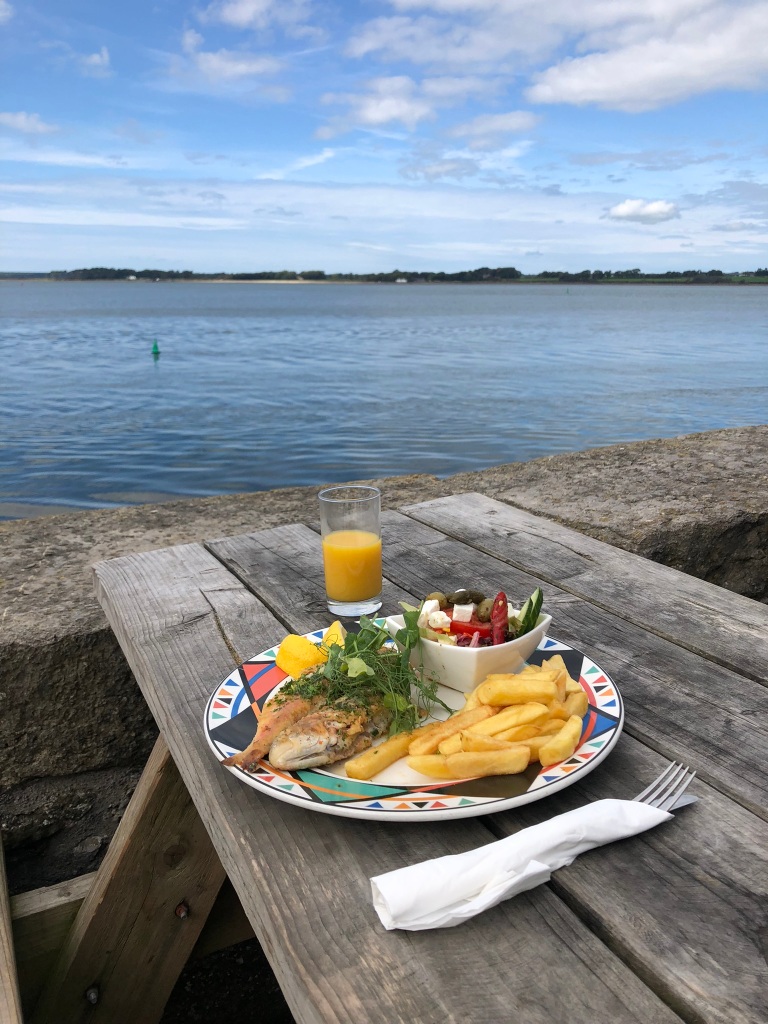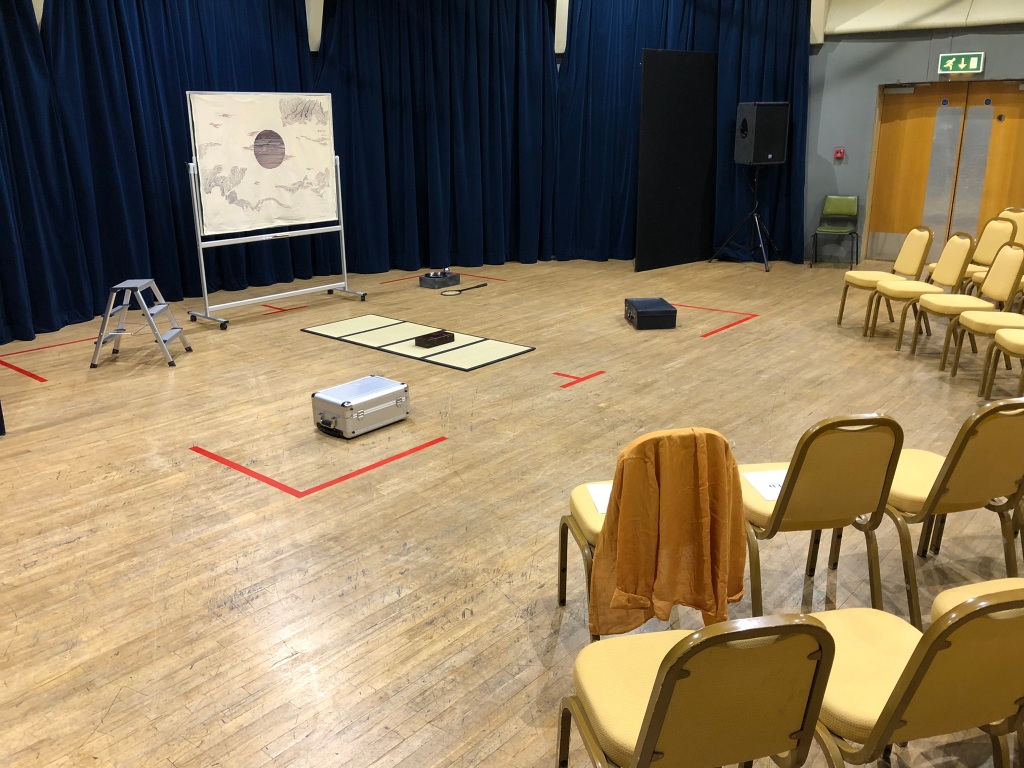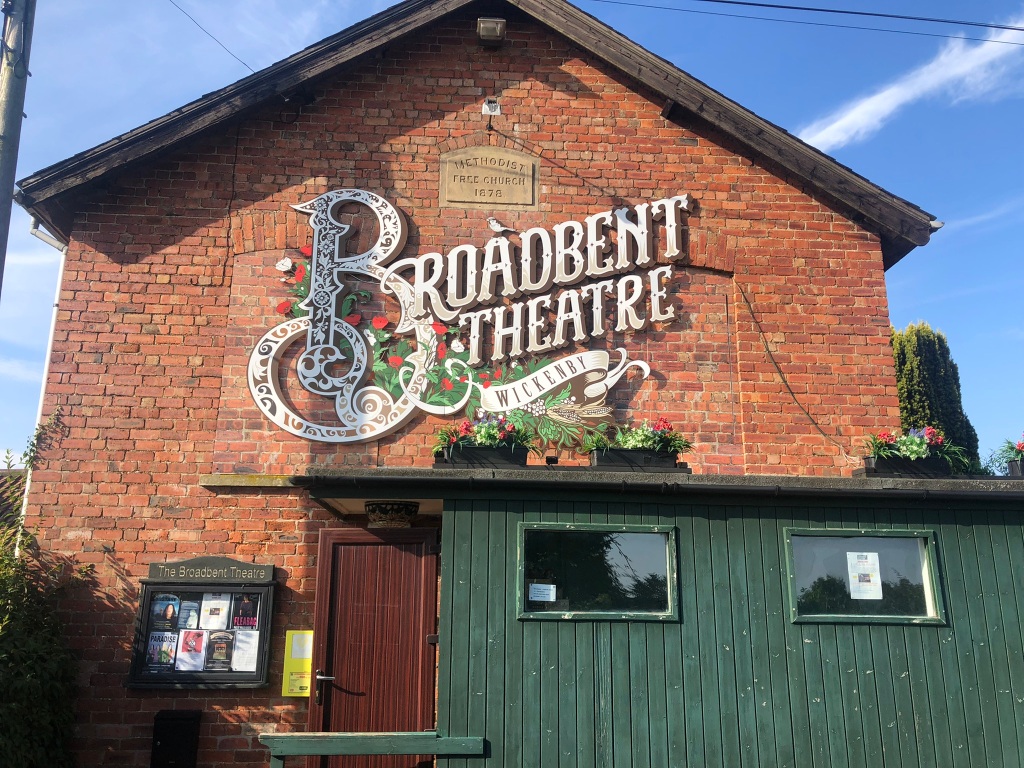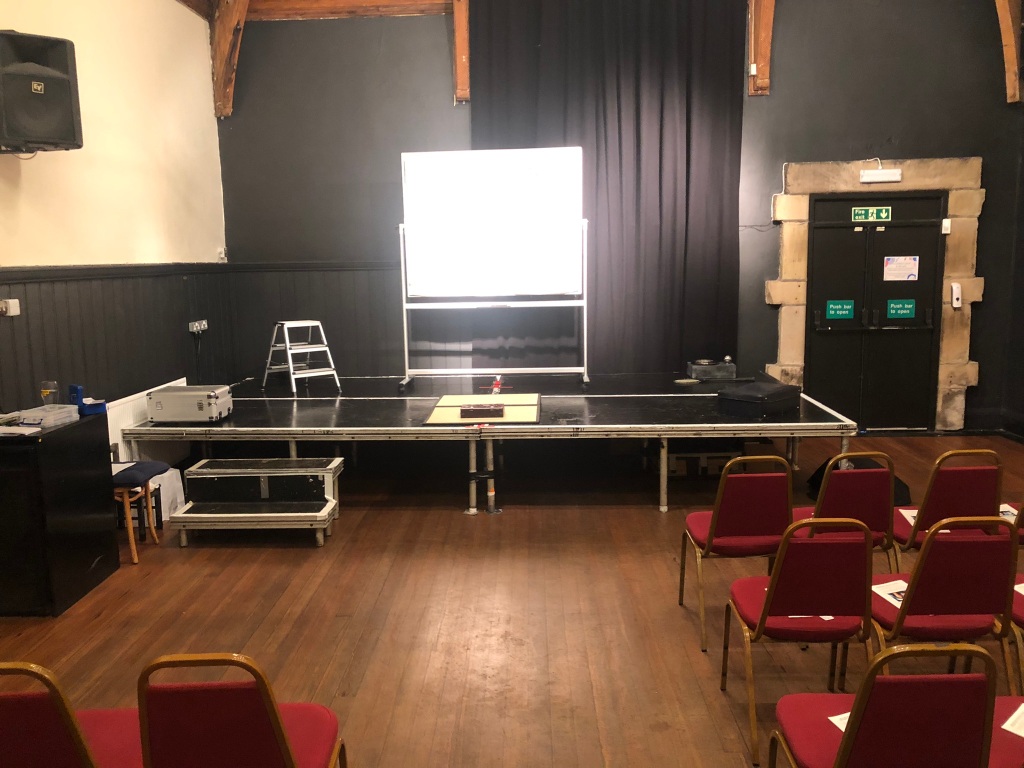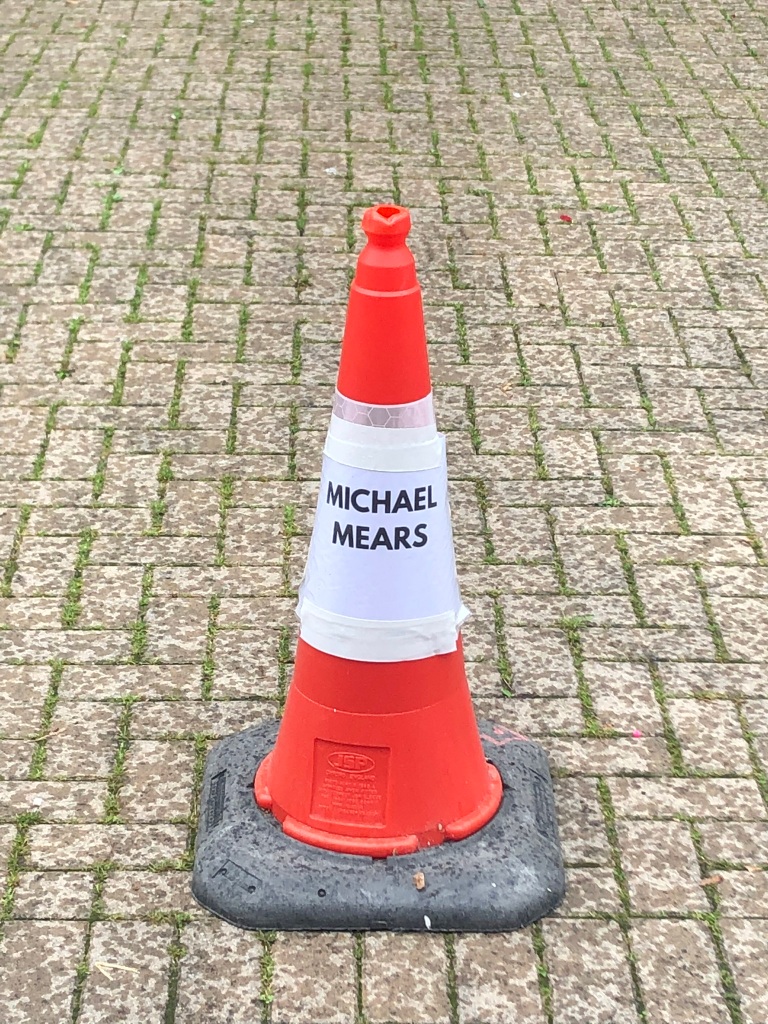October 5th. After I’ve spontaneously performed ‘The Priest’s Tale’ for an audience that had been expecting ‘The Mistake’, Kelly and I pack everything away and make our way over to the Head’s house, where…we’re relieved to find Riko, back from hospital, sitting in the cosy living room, seeming fine, in need of a little rest certainly, but telling us the doctor wasn’t overly concerned apparently. Fingers crossed that normal (or near to normal) service will be resumed in York, loveliest of cities, on Saturday night.
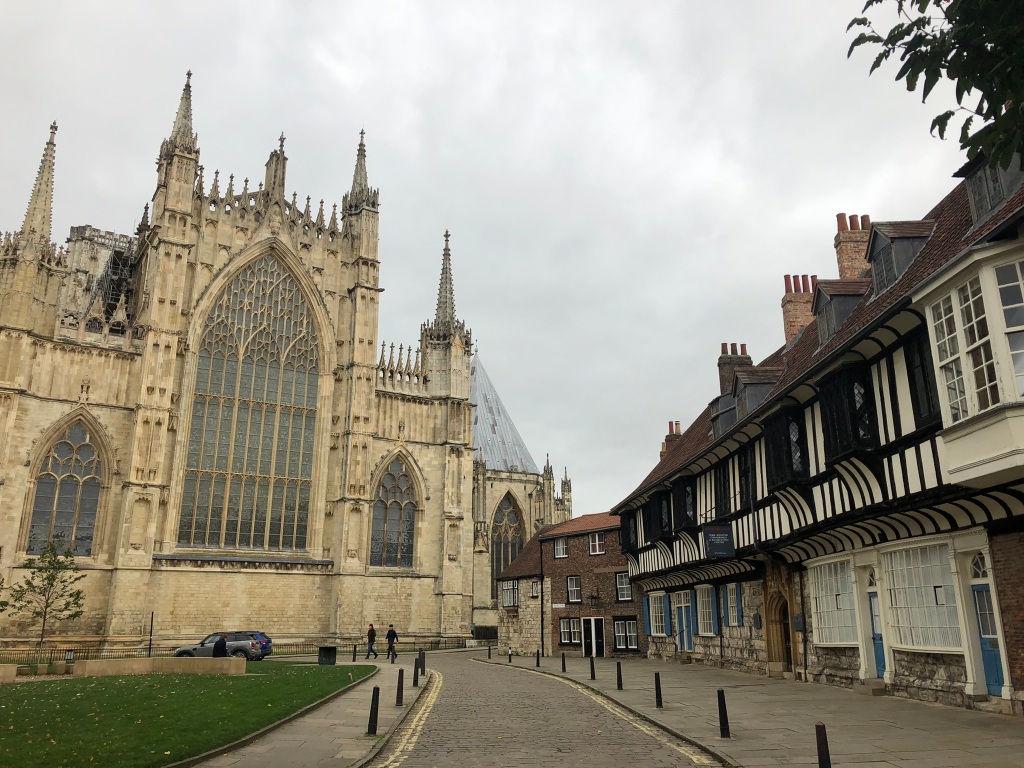
Indeed it is. Riko performs brilliantly to our sold-out house, then we all relax, having a couple of days off here, a chance to rest, recuperate, and explore the Shambles, the Minster, the city walls and York’s many other delights.
Tuesday morning we’re up bright and early to perform in York’s Bootham School. At 10.15am, we’re perched high up on the school stage waiting for the imminent arrival of almost 300 pupils, ages ranging from 12 to 18, who will sit in serried ranks below us.
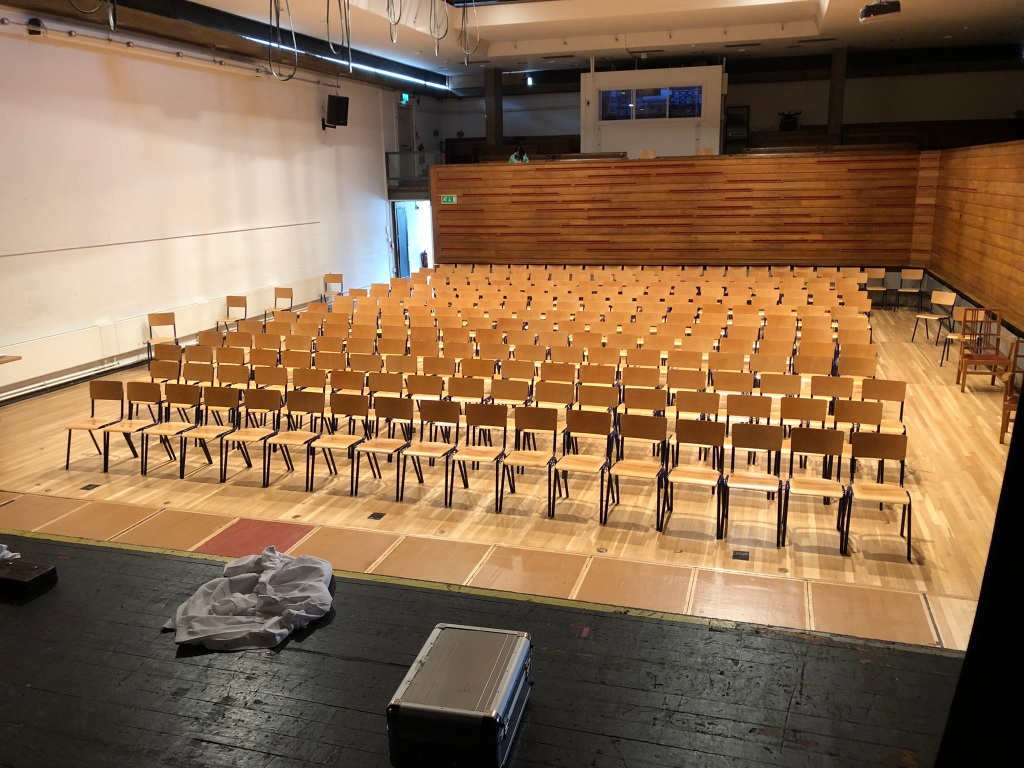
When the lights go down, there is a huge roar from them all. Then silence. For 45 minutes. Then an interval. (The only one we ever have, a special request from this particular school). Then more silence for the remaining 35 minutes of the play. Then, as the lights fade to black-out, another huge roar. Of relief, I wonder?
At the Q and A, and at lunch too, it’s clear that the older students were engaged and got a lot from the play, but that the 12 and 13 year-olds were just too young. One student of Chinese heritage challenges me both in the Q and A and in the workshop we take after lunch, that I don’t mention in the play the sufferings inflicted by the Japanese Army on Chinese civilians in Manchuria. I respond by saying that I do briefly reference (in the voice of the Pilot, General Tibbets) atrocities committed by the Japanese in WW2. But the Chinese student is persistent, speaking with real feeling about how the Japanese weren’t just innocent victims. Feeling rather chastened, I apologise to him for not having more knowledge about this aspect of the war, and I promise to try and become better informed.
(I remind myself that it was in Yorkshire at Ackworth School six years earlier, that two students from Nigeria and Ukraine asked me equally hard questions about pacifism and conscientious objection.)
Before we leave York, I receive the melancholy news that our two performances at Royal and Derngate in Northampton in a couple of weeks’ time have to be cancelled due to the current crumbling concrete concerns (or RAAC) that have come to light in many buildings round the country. This is a blow for their theatre – and also for us, as it’s too late to book anywhere else at such short notice, so we’ll just have a couple of extra days off instead.
We leave Yorkshire for the west Midlands where next day we have another daytime performance, a matinee, at the Bewdley Festival – playing the Baptist Church, where I also performed my last play in 2017. A huge wooden cross is suspended over the ‘stage’ which is not going to seem appropriate at all, and which will also be in the way of our mobile blackboard. Luckily it can be temporarily unscrewed, taken down and put to one side.
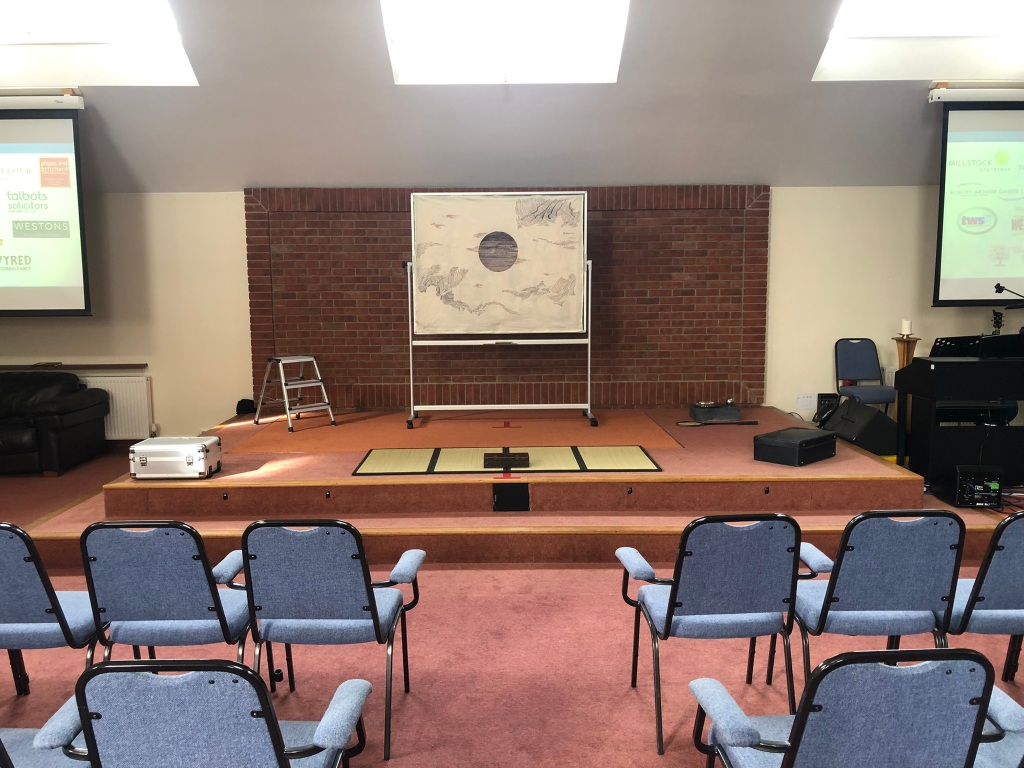
This is our first performance to adults since the terrible atrocities a few days earlier, on October 7th, of the attack by Hamas in Israel. With this news still reverberating in the air, the play feels electric… so many lines and incidents in the play resonate with heightened intensity – the cursing of the enemy, the cycles of hatred and the deaths of innocent children. I feel very moved by the whole event today – as do the audience.
The following evening we are just 25 miles away at the Midlands Arts Centre, in the delightful Hexagon Theatre, and with its dusky brown, or almost dark gold, wood panelling, its hexagon shape and steeply raked auditorium, it resembles a lecture theatre. Apparently it is indeed hired for such a purpose on various occasions. But tonight it hosts THE MISTAKE – a play in which a large blackboard features prominently, on which highly intelligent scientists of the calibre of Leo Szilard and Robert Oppenheimer (oh and that other chap, what’s his name? Albert wotsit…) scrawl incredibly complex equations and theories, so yes, this feels like an appropriate setting in which to perform the play.
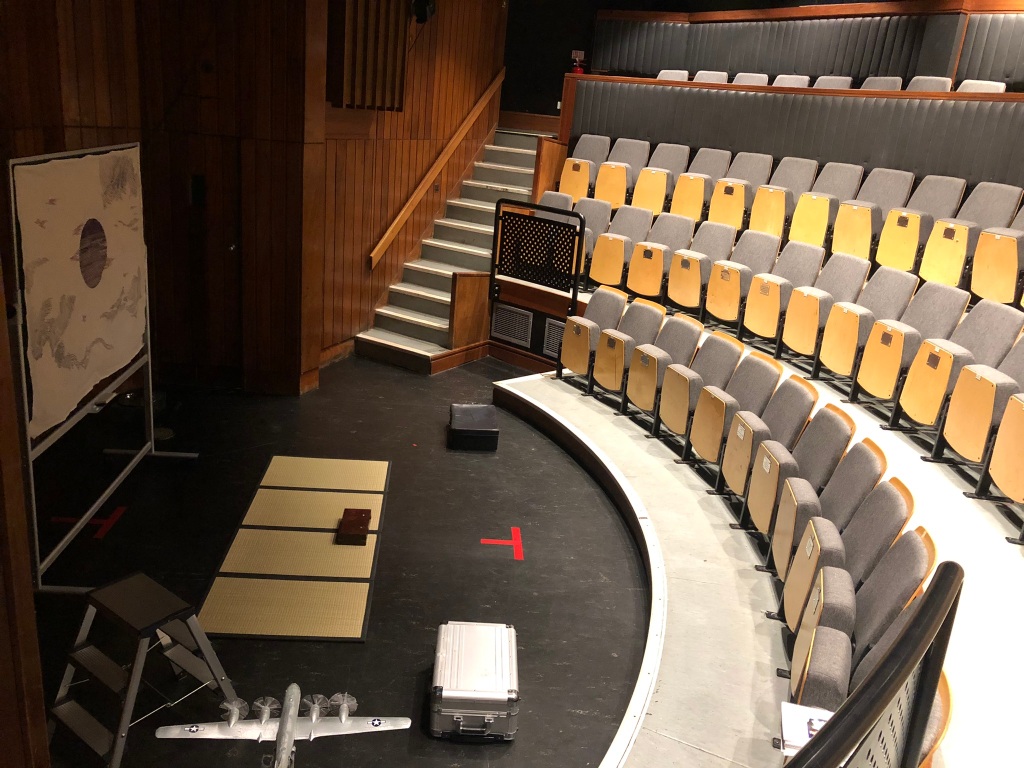
The house is fairly full, but one seat is conspicuously empty, a space for someone in a wheelchair – a lady who is coming with her companion, or rather, is supposed to be coming, but now, at 7.35pm, five minutes after we should have started, is nowhere to be seen. Should we begin without her, we wonder? But then if she and her companion do arrive, it won’t be straightforward getting them into the theatre, across the stage with our props and into her reserved space, without something of a hiatus in the fast-moving action of the play.
But just outside in the foyer the whirring of a lift can be heard, and a few moments later the lady in the wheelchair appears along with her companion, who wheels her over to her space. The auditorium doors are finally closed, I glance up at Kelly our stage manager, indicating that I’m ready to begin, when just to my left the lady in the wheelchair asks in a very loud voice, ‘Is it too late to get a glass of wine?’
In my career I’ve played numerous waiters, perhaps most notably in the film Four Weddings and A Funeral, when I ask Hugh and Andie (well, their characters) what they’d like to drink. I feel myself regressing through the decades, about to approach the lady in the wheelchair and announce to her, ‘Of course it’s not too late, madam. Red, white or rose?’
Fortunately I don’t do this, and fortunately she doesn’t pursue the idea, and the play begins, the golden wood-panelling reflecting the lights beautifully, the blackboard loaded down with its equations behaving itself perfectly.
Week 7 sees us head north again – to Buxton in the glorious Peak District.
But no, we’re not performing on the stage of Buxton Opera House, but on a tiny corner stage in the delightful Green Man Gallery, which can just about seat 60 people in and amongst the many paintings on display.
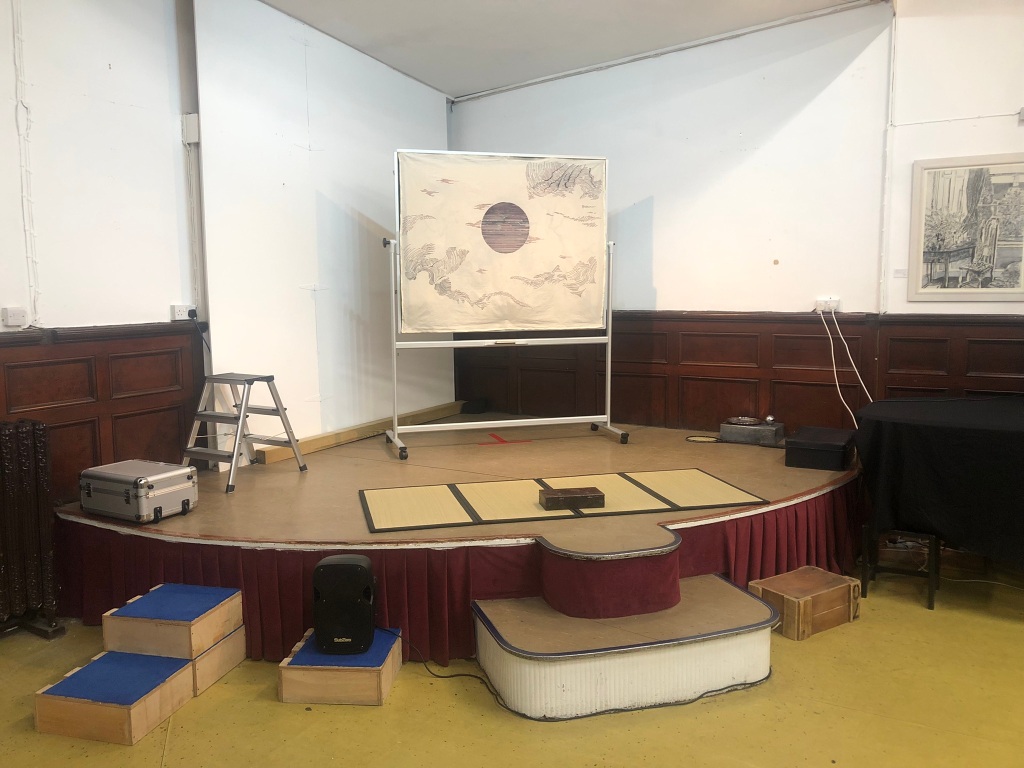
Our accommodation for two nights is in the charming Cottage Of Content, a cottage which is 17th century in parts, and where, thanks to our lovely hosts, we feel very content indeed.
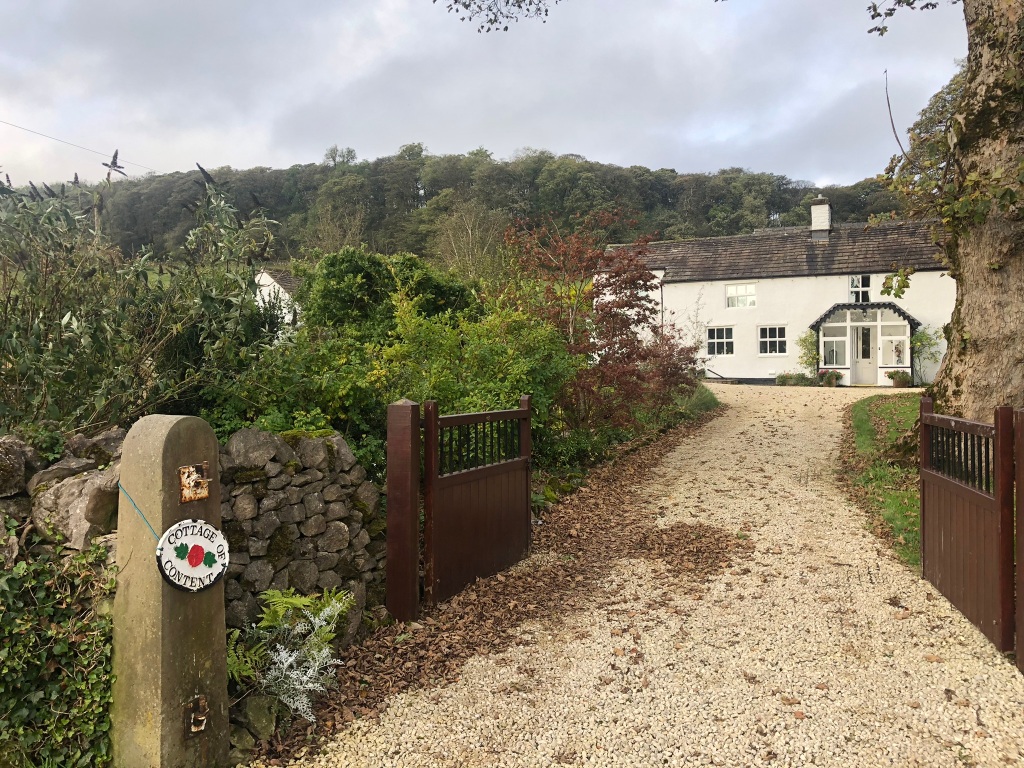
On to east Anglia, but Storm Babet is brewing, hitting various parts of the country. We perform at Diss Corn Hall, then drive for an hour after the show to get to the coast and our next location, Aldeburgh, as the rain begins to make itself felt.
I’m so looking forward to performing at the historic Jubilee Hall, where Benjamin Britten and Peter Pears and many others have performed, but I’m counting my chickens…
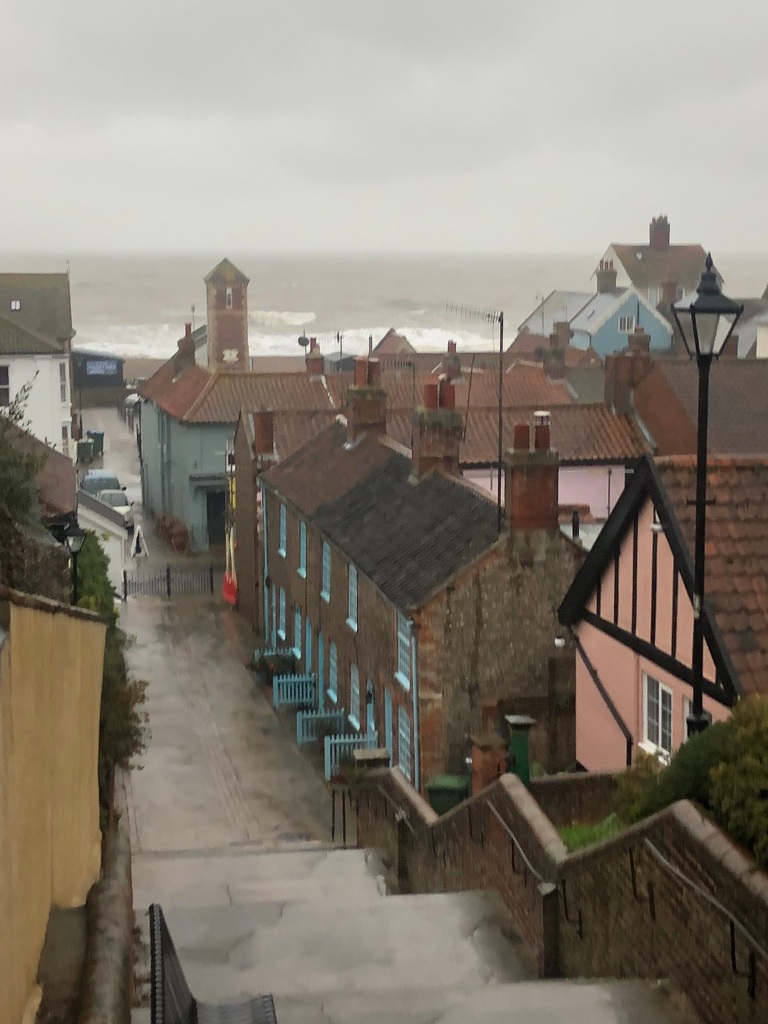
Next morning the weather is diabolical and at 12 noon, just two hours before we’re due to go in and set up, the venue manager phones me to say that due to the conditions and travel advice and blocked roads and local flooding, he’s going to have to cancel – as our audience probably wouldn’t be able to get to the Hall. That’s if they dared to venture out at all.
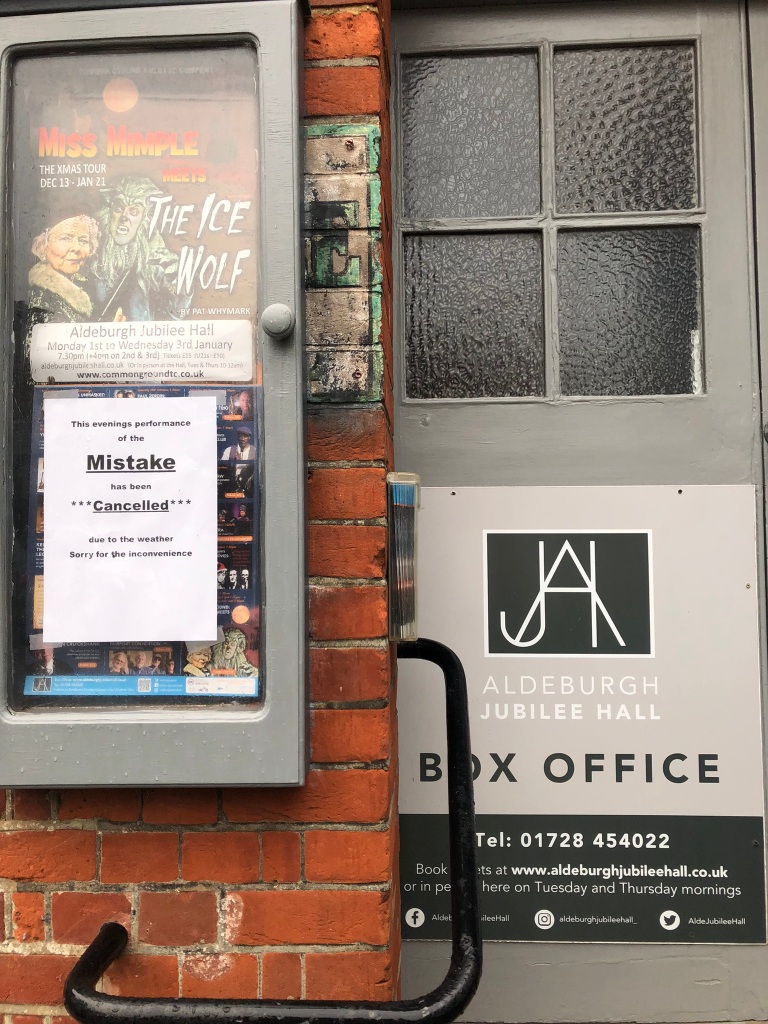
That melancholy feeling again. Another unexpected day off.
So next morning we leave Aldeburgh having had fish and chips, a blustery walk along the front (the weather a little calmer now) but no performance, and head to Bury St Edmunds Quaker Meeting House and a packed audience – minus the few who can’t get in because there’s still flooding in those parts.
Next day it’s back to London, where at the end of the week we will return to where we started rehearsing – the magical Sands Films Studios for two nights, playing to packed houses with both performances live-streamed and recorded.
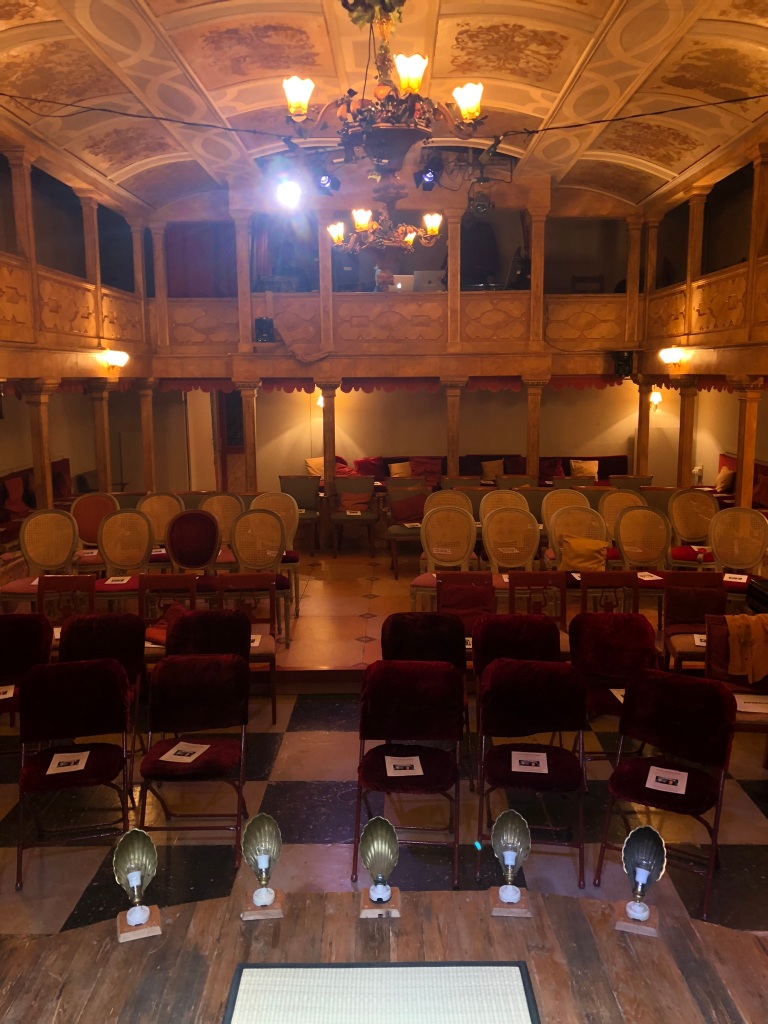
This time it’s not Ed Sheeran (or his lookalike) who is spotted in the audience. A friend texts me afterwards, asking, ‘Mark Rylance??!! Was that Mark Rylance in the audience?’
‘Yup,’ I can confidently reply, ‘it was. I invited him.’
But I’m thrilled he’s actually able to make it. And that he stays for the Q and A.
We’ve had two excellent shows here and we all feel this should be the natural end of the tour. But it isn’t quite…
A weekend off, then it’s down to Canterbury for the actual final performance of the tour – involving a drive through the MOST torrential rainstorm I have ever driven in. Will it never end, will it never end, I mutter to myself, as the windscreen wipers feebly try to beat away the deluge.
After an excellent show and another very passionate Q and A, I go to stay with my friends at Herne Bay. Next morning, all is peaceful. Blue skies, a calm sea…I inhale and exhale long deep breaths…
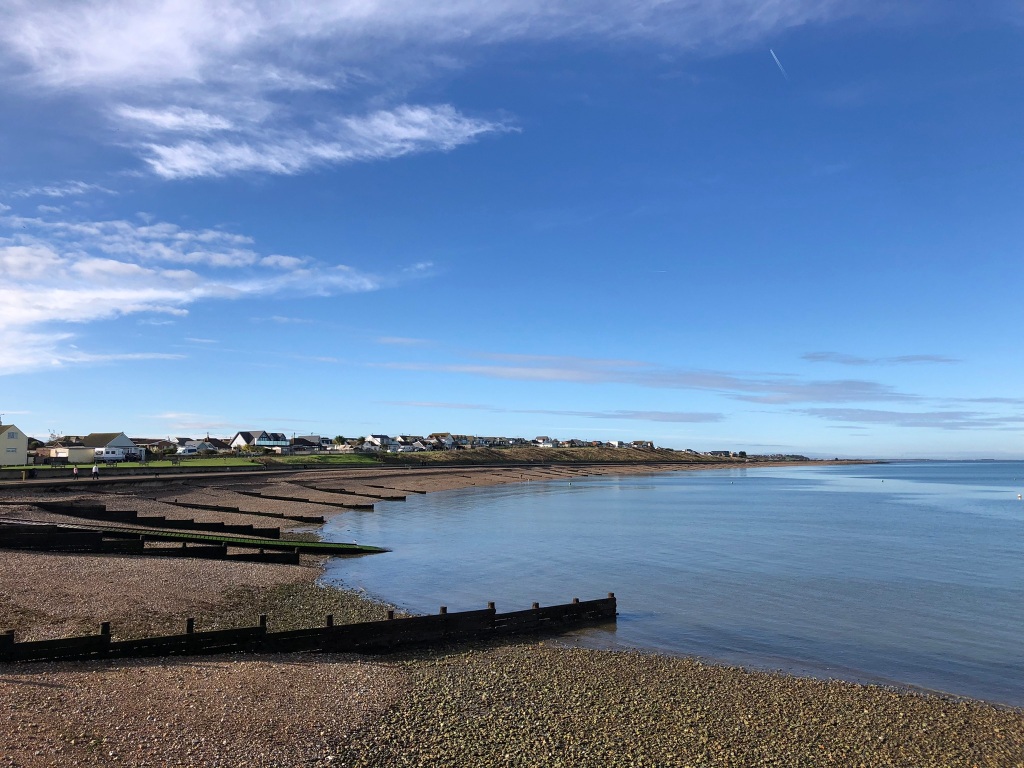
Then I drive back into Canterbury where Riko, Kelly and myself have a final farewell brunch before heading back to London and our own beds.
I drop Kelly off in Wimbledon and leave the van for two minutes to help her in with her suitcase, returning to find…a warden giving me a ticket! No!
I can’t believe it. The very last moments of the tour and I’m getting a ticket? I try to reason with him about the heaviness of Kelly’s suitcase, that I was only away for a minute or so, but he is insistent.
Yet again I feel a wave of melancholy. What a way to end the tour. I just stand there watching him, then say, with genuine feeling, ‘I’m sorry. I’m really sorry.’
This seems to stop him in his tracks. I’m not confronting him, not showing any aggression but simply expressing genuine repentance.
He takes a deep breath, puffing himself up for a moment with a little brief authority, then says, ‘Alright. I’ll tell you what I’m going to do. I’m going to let you off on this occasion – but don’t EVER do it again.’
‘No, officer, I won’t.’
‘You or someone else should have stayed with the vehicle.’
‘Yes, officer, of course, officer. Thank you, officer.’
Phew.
My feared parking fine when we were in Stratford never materialised and now this…hoorah! I’ve managed to complete the tour with no scratches on the vehicle and no parking tickets. Mr. Warden drives off on his motorbike leaving me to return the van and that, my friends, is that.
What a tour. So many miles, in all weathers, playing every type of venue (apart from an Opera House) and with such responsive audiences. Wonderful hosts, enthusiastic organisers and super-helpful and friendly technical crews. No Arts Council grant. But a wave of generous support from crowd-funders, supporters and chums, without whom the tour would have been exceedingly difficult to pull off.
So. A deeply rewarding experience. Yes. Worth all the effort it took me putting it all together. But now… my bed awaits me.
Because not to put too fine a point on it, I am totally knackered.
Thus, my long slow return to everyday reality begins…until the next time that is… (watch this space)
